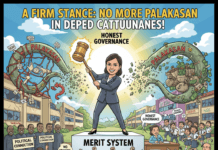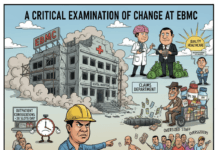By: Richard Santiago/ELBOW ROOM
In a previous column, I emphasized the importance of focusing on evangelization rather than the mere beautification of our parishes. This sentiment resonates with the message delivered by Cardinal Advincula, who urged the Church to listen to the poor instead of burdening them with projects that prioritize physical enhancements over spiritual growth. While the construction and maintenance of beautiful churches are significant, they should never overshadow the primary mission of priests and pastors: to nurture the spiritual well-being of their flock.
We can appreciate the aesthetic value of our churches, but we must remember that these structures are meant to serve as vessels for spiritual nourishment, not as monuments of grandeur. Cardinal Advincula’s homily serves as a poignant reminder that the Church’s mission is not to impress with physical beauty but to touch lives through genuine pastoral care. The Church’s focus should be on building a community that reflects Christ’s love, especially to those who are marginalized and unheard.
Unfortunately, it seems that some parishioners are drifting away from the Church, not because of the lack of beautiful churches but due to conflicts of interest involving certain clergy members. This reality should prompt a moment of reflection for all of us. Are we as a Church, as a diocese, truly living up to our calling? Are we placing the needs of the poor and the spiritual needs of our community at the forefront of our mission? Or have we become too preoccupied with outward appearances and internal conflicts?
The Church’s true beauty lies in its ability to bring people closer to God, to provide solace and hope in times of despair, and to be a voice for the voiceless. If we lose sight of this mission, no amount of beautification will compensate for the spiritual emptiness that may ensue.
It is time for a shift in priorities. We must heed the call to be a listening Church, as emphasized by Cardinal Advincula. By listening to the poor, to the Earth, and to the Holy Spirit, we can rediscover the true essence of our faith. This approach will not only strengthen our communities but also bring us back to the core of what it means to be followers of Christ.
The Church’s mission is not static; it must evolve with the times, responding to the needs of the people it serves. As we continue on this synodal journey, let us be guided by the examples of Abraham and Mary, who responded to God’s call with faith and obedience. Their courage and humility should inspire us to move beyond old ways that no longer serve our community and to explore new paths that lead to deeper faith and stronger connections.
In conclusion, while we may value the beauty of our churches, let us never forget that the heart of the Church lies in its spiritual mission. Let us strive to be a Church that listens, a Church that serves, and a Church that truly embodies the love of Christ in all that we do.
*************
As we celebrate the golden jubilee of the Diocese of Virac, we are reminded of the profound wisdom shared by Manila Archbishop Jose Fuerte Advincula: “To have a burning heart, we begin with a listening heart.” This message resonates deeply, especially as we reflect on the journey of our diocese over the past 50 years.
The archbishop’s words highlight a truth that is often overlooked in our pursuit of grand dreams and ambitious projects. In our eagerness to serve, we sometimes rush ahead with plans and strategies, confident in our knowledge and intentions. Yet, how often do we pause to truly listen? Listening, as Archbishop Advincula points out, is not just a preliminary step but the foundation of all meaningful action.
In the rush to achieve and make a difference, it’s easy to overlook the subtle but powerful act of listening. Listening to the Holy Spirit, to the cry of the poor, and to the cry of the Earth are not just spiritual exercises; they are acts of love and service. For a diocese like ours, which is no stranger to the devastating impacts of typhoons, this call to listen is even more urgent. We are on the frontline, hearing the groaning of the seas and the mountains. But are we truly attuned to the voices that matter most—the voices of those who suffer, who feel marginalized, and who long for a church that is responsive and compassionate?
Archbishop Advincula’s reflection reminds us that a passionate heart, while admirable, is not enough. Passion without listening can lead to burnout and frustration, especially when our efforts do not yield the desired results. When we fail to listen, we miss the guidance of the Holy Spirit, who alone knows the true needs of the people we are called to serve. This is a critical lesson as we strive to transition from a maintenance church, content with preserving the status quo, to a synodal church that is dynamic and mission-oriented.
The examples of Abraham and Mary, as highlighted by the archbishop, serve as powerful models for us. Abraham’s obedience in leaving everything behind to follow God’s call and Mary’s courageous “yes” to God’s plan are testaments to the power of faith and the importance of listening. They listened deeply, and their listening led to action—action that changed the course of history.
As we mark this milestone in our diocese’s history, let us take these lessons to heart. The golden jubilee is a time of gratitude for the many blessings we have received, but it is also a moment of humble introspection. We must acknowledge that we have not always been faithful to the call of Jesus. There have been times when we failed to listen—both to God and to the people we serve. This anniversary calls us to renew our commitment to being a listening church, a church that is not afraid to embrace new ways of preaching the Gospel and reaching out to those who feel alienated or hurt.
Let us move forward with the faith of Abraham, the docility of Mary, and a renewed dedication to listening. Only by doing so can we truly fulfill our mission as a church of communion, mission, and participation. Our future depends on it, and so does the well-being of the community we serve. In this spirit of listening, may we continue to discern the signs of the times, guided by the Holy Spirit, as we journey together towards a more just and compassionate world.
*****************





















